|
|
|
Sort Order |
|
|
|
Items / Page
|
|
|
|
|
|
|
| Srl | Item |
| 1 |
ID:
187444
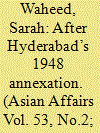

|
|
|
|
|
| Summary/Abstract |
This paper revisits the violent annexation of the erstwhile princely state of Hyderabad by the Indian army in 1948 as an inaugural moment of dispossession to reconstruct Hyderabad's twentieth century past along the axes of Muslim belonging and memory. I argue that we must situate twentieth and twenty-first century Hyderabadi Muslim migration in relation to Partition-related displacements and attempts to overcome them through economic conditions provided by migration. The partition of India prompted waves of migration—such as the later migration of Hyderabadi Muslims to the Persian Gulf in the wake of 1970s oil boom—and their sense of displacement persisted long past the mid-twentieth century, reshaping Muslim notions of belonging. The use of the nation-state as the dominant framework to analyze these shifts is insufficient for understanding Hyderabadi Muslims' sense of belonging and citizenship, which must be also contextualized in terms of upward class mobility along the axes of global and local contexts.
|
|
|
|
|
|
|
|
|
|
|
|
|
|
|
|
| 2 |
ID:
187445
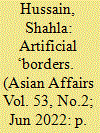

|
|
|
|
|
| Summary/Abstract |
This article focuses on the contested region of Kashmir and investigates how the nation-building project that accompanied the partition of the South Asian subcontinent, along with the creation of the ceasefire line that divided the former princely state of Jammu and Kashmir between India and Pakistan, shaped the question of belonging for the majority of its Muslim inhabitants, especially from the 1940s to the 1960s. It reveals the bureaucratic procedures put in place by the new nation-states, both driven by the question of self-determination pending in the United Nations and devoid of human considerations, made Kashmiris apprehensive about the motivations of both states. The article argues that Kashmiri belonging after partition did not seamlessly merge into the national identities of India or Pakistan. Instead, the anxieties of partition and structural challenges created by the arbitrary ceasefire line shaped Kashmir Muslim perceptions. Drawing from intercepted letters, pamphlets, and biographies, this article reveals the irrelevance of such artificial ‘borders’ in the Kashmiri psyche. In the process, it asserts that the Kashmiri demand for self-determination became intertwined with the desire for the reunification of the old princely state that would promote human-to-human contact, reopen old trade routes, and promote economic self-sufficiency.
|
|
|
|
|
|
|
|
|
|
|
|
|
|
|
|
| 3 |
ID:
187440
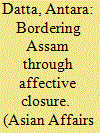

|
|
|
|
|
| Summary/Abstract |
In 1971 when nearly ten million refugees crossed the border between East Pakistan and India following the outbreak of violence in Dacca on 25 March 1971, it would have surprised many to know that nearly fifty years later that date would be the dividing line between India's putative citizens and those it deemed ‘foreigners’. This article takes a look at the immigration debate in Assam, and the protests against the National Register of Citizens and the Citizenship Amendment Act to argue that it is the erasure of 1971 from the latter that gives rise to the backlash against it. I argue that the events of 1971 produces a moment in which both an affective border emerges against the refugees, followed soon after by an effective legal border through citizenship legislation pertinent to Assam. This article investigates the peculiarity of this moment to determine citizenship within India, its consequences and by doing so rewrites the history of 1971 back into debates about citizenship in India.
|
|
|
|
|
|
|
|
|
|
|
|
|
|
|
|
| 4 |
ID:
187441
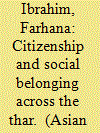

|
|
|
|
|
| Summary/Abstract |
In this article, I examine the 1971 war (better known as the war for the liberation of Bangladesh) from a western Indian perspective. I argue that this war between India and Pakistan—while it focused overtly on the independence of East Pakistan—had some significant consequences for the western border between Kutch (in Gujarat state) and Sindh (in Pakistan). I suggest that this military conflict and the subsequent brief Indian occupation of Tharparkar in Sindh allows for a significant re-thinking of questions of citizenship, identity and belonging that were sparked off in 1947 and that have been re-ignited in the context of recent debates over the controversial Citizenship Amendment Act (CAA), enacted in December 2019.
|
|
|
|
|
|
|
|
|
|
|
|
|
|
|
|
| 5 |
ID:
187447
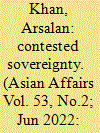

|
|
|
|
|
| Summary/Abstract |
Pakistan has witnessed the rise of a range of Islamic forces that claim to be defending Islam from what they imagine to be a deluge of incidents of blasphemy, a veritable moral panic organized around a set of blasphemy laws pertaining to the regulation and protection of Islam. The violence of blasphemy politics, which is disproportionately directed at sectarian and religious minorities, is predicated on the claim that is the duty and mandate of the state to enforce the blasphemy laws, and where the state fails, the onus falls on ordinary Muslims to fulfill the demands of Islam. In this article, I focus on the response to this blasphemy politics by Pakistani Tablighis, practitioners of the transnational Islamic piety movement the Tablighi Jamaat. Like other Islamic groups in Pakistan, Tablighis consider blasphemy to be a grave sin and a deep threat to the Islamic community, but Tablighis believe that the solution to the growing incidence of blasphemy is to spread virtue through their distinct form of face-to-face preaching (dawat). I show that these different ethical responses to blasphemy reflect different approaches to the relationship between Islam and state sovereignty. Specifically, I argue that blasphemy politics presupposes the sacralization of the state but Islamic piety among Pakistani Tablighis provides an alternative ethical framework for addressing the moral injury of blasphemy.
|
|
|
|
|
|
|
|
|
|
|
|
|
|
|
|
| 6 |
ID:
187439
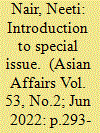

|
|
|
|
|
| Summary/Abstract |
On 9 December 2019, the Lok Sabha, the lower house of India’s parliament, passed a Citizenship Amendment Bill that makes it easier for religious minorities – enumerated as Hindus, Sikhs, Christians, Parsis, Jains and Buddhists – in the three neighbouring states of Pakistan, Bangladesh, and Afghanistan to acquire Indian citizenship. The frequent recourse to particular interpretations of historical events – of the Partition, the war of 1971, and the recent abrogation of article 370 in Kashmir – during the daylong parliamentary debate made it clear that these interpretations of the past have influenced the making of policies that aim to affect the future of religious minorities across South Asia.
|
|
|
|
|
|
|
|
|
|
|
|
|
|
|
|
| 7 |
ID:
187442


|
|
|
|
|
| Summary/Abstract |
Scholars have paid significant attention to the linguistic reorganisation of states in India but there is less consideration of how the demands of linguistic movements to redraw the map of India is linked to the history of partition across the colonial-postcolonial divide as well as of the new minorities that linguistic states created. This article draws attention at first to the unsuccessful pre-partition resistance of Sindhi Hindus to the separation of Sindh from the Bombay Presidency on linguistic lines as separation would make them a religious minority. The article then discusses Sindhi resettlement in India as deterritorialised partition refugees, when they had to claim belonging in the context of reinvigorated calls for the redistribution of boundaries based on linguistic majorities. As an alternative to territorial representation, Sindhi refugees successfully sought inclusion in the Eighth Schedule of the Constitution of India, a list of officially supported languages meant originally to enrich Hindi. This history reveals how partition and partition's refugees reshaped constitutional conceptions of minority citizenship in a manner not yet acknowledged. The inclusion of Sindhi in the Eighth Schedule transformed the Schedule's primary purpose from that of augmenting Hindi to additionally conferring protections to a group of minority languages. The Sindhi demand for inclusion paved the way for other minorities whose linguistic identity did not necessarily map neatly on to a geographically defined state to claim recognition in the Schedule. This opened a new but limited option for constitutional safeguards for linguistic minorities without a linguistic state in India.
|
|
|
|
|
|
|
|
|
|
|
|
|
|
|
|
| 8 |
ID:
187446


|
|
|
|
|
| Summary/Abstract |
This article pivots around poetry as a category of analysis; and the figure of a poet as a humanistic optic to look at how forms of resistance are shaped in public and private domains in the Indian occupied Kashmir. The analysis considers poets writing in Kashmiri, other vernacular languages as well as English, and Urdu. In an occupied zone, where a war stands at all corners of the homes and streets, poetry ceases to be mere words. Poetry becomes Ehtijaj (meaning “protest” or “dissent”, both in Urdu and Kashmiri). Poetry as Ehtijaj is a “situated” act, a deeply political gesture; written, embodied, commemorative and sometimes unsaid. It is a form of “placemaking” in the face of erasure and occupation. As a situated act of dissent, of placemaking, poetry emerges also as a “right to a remembered presence” (see Said, E. W. Invention, Memory, and Place. Critical Inquiry, 26 (2), (2000) 175–192). It becomes a way to history, and commemoration, however feeble the effort might seem in face of the hegemony of the occupying power of the Indian nation.
|
|
|
|
|
|
|
|
|
|
|
|
|
|
|
|
| 9 |
ID:
187443


|
|
|
|
|
| Summary/Abstract |
The experience of migration as a result of the Partition of the Indian subcontinent has an entirely different level of meaning than that subsumed in migration alone. Here the issues are related to the splitting, in a most organic way, of culture, history, tradition and continuity. Noted modern Urdu writer Intizar Husain was the first to come up with the idea of describing the migration as hijrat. What is the past? When one ponders on this, then history, religion, ethnicity, mythology, old folktales, belief and fears all come into play.
|
|
|
|
|
|
|
|
|
|
|
|
|
|
|
|
|
|
|
|
|